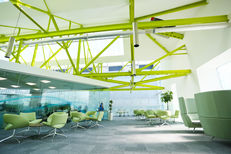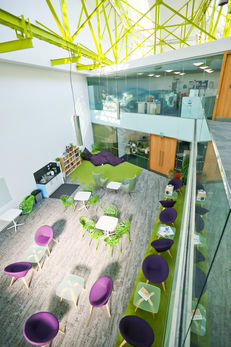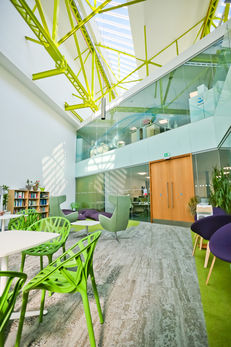When refurbishing the Water Sciences Department at Cranfield University, Tracy Flynn, Development Project Manager, wanted to create a flexible space that would provide staff and students with areas to work independently, as well as places where they could work collaboratively to discuss ideas.
Tracy was keen to use the principles of biophilic design – which is inspired by our instinctive love of nature – as a basis for the interior concept, as research demonstrates nature-inspired design can have a significant impact on the creativity, productivity and well-being of users of a space.
As a long standing customer of Interface, Tracy chose to work with the global flooring manufacturer’s in-house concept design team to create distinct zones within the 1,000m² space. Comprising of a breakout area and coffee shop, as well as two levels of offices and a boardroom, the interior design needed to complement the key structural components of the building. This includes brightly painted steel girders and floor to ceiling windows.
Interface’s Concept Designer, Amy Farn, suggested Interface’s Human Nature collection for the 100m² area of floor space in the coffee shop and breakout space. Inspired by the varying colours, textures and patterns in nature, the range was used to delineate the area from surrounding offices and create a space for students to relax, interact and study communally.
Skinny plank shaped, nickel coloured tiles with a pebbled pattern (Human Nature 810, 840 and 850), were used alongside a kiwi accent tile, which mimics the tones and variation in grass (Human Nature 830).
Also inspired by the random beauty of nature, Interface’s Transformation range - a random pattern carpet tile, which reflects the organic pattern of leaves scattered on a forest floor - was used to create a non-directional installation in Buckeye and Steppe colourways. The use of Transformation throughout the hallways and communal areas created a seamless transition between different areas, and helped to create peaceful spaces for concentration in offices and meeting rooms.
Amy Farn said: “The coffee area is a focal point of the building, and this is emphasised by the floor to ceiling glass partitions which separate the office from this space. Our aim was to create a design that would draw people’s eye using bright colourways and bold patterns. The flooring design complements the biophilic elements of the building design - such as the large amounts of natural light which flood the main area of the space.”
Tracy Flynn commented: “One of our key objectives when refurbishing the space was to create an area which suited the working styles of all of our staff and students. This included quiet spaces for reflection and independent working, as well as creative spaces for our students to discuss ideas and work collaboratively. The biophilic inspired products from Interface really helped to bring that concept to life, along with elements such as natural light and plants.
“Interface’s products also provide significant functional and sustainability benefits. The random design of Transformation, reduces installation waste to less than 2 per cent, as well as making selective replacement easy and cost effective.”
For more information on the Interface products mentioned, please visit www.interface.com










 Except where otherwise stated, content on this site is
licensed under a Creative Commons Attribution 3.0 License.
Except where otherwise stated, content on this site is
licensed under a Creative Commons Attribution 3.0 License.
